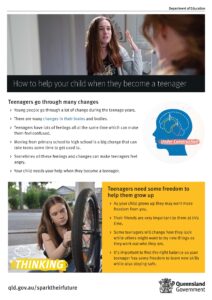Key Points
- It’s normal for teens to seek greater freedom as they get older.
- Though they may not always show it, your child needs you and your guidance during the teenage years.
- Look for ways to connect with your teen so you can keep the communication lines open.
- While your teen might be moody and angry with you, try not to take their behaviour personally.
- If you are concerned about your child’s mental health and wellbeing, please contact your family doctor and Beyond Blue (1300 22 4636), Lifeline (13 11 14) or Kids Helpline (1800 551 800).
Most teens are energetic and thoughtful people who are trying to understand who they are. Just as each person is different, each teenager will have their own unique experience of the teenage years. However, with all the changes going on in their brains, with their hormones and in their lives, most teens will feel some sense of confusion as they navigate their teenage years. Some teens will struggle to talk about how they are feeling and instead, will behave in ways that range from moodiness to all out explosions of anger and everything in-between. And while it won’t always seem like it, as your teen makes the transition from child to adult, they need you by their side more than ever.
Why teens need to assert their independence
It’s normal for teens to look for ways to experience being independent; it’s all part of a young person’s transition to adulthood. How they are viewed by their friends becomes increasingly important for many young people during the teen years. Some teens will ‘try on’ different looks and identities as they search for who they want to be in the world. Some young people will rebel and take risks and even those teens who don’t have a rebellious streak may resist advice from their parents in an effort to create a sense of having some control over their lives. For your teen to grow into a self-motivated and capable adult, they need a chance to experience greater freedoms so they can learn how to operate in the adult world. If you can find a balance between giving freedoms and setting limits, you can help your teen become a self-disciplined and capable young adult.
How teens experience emotions
The way teens experience emotion can sometimes make it hard for them to deal with everything they are feeling. This can lead to lots of emotional ups and downs. A 2018 study 1 mapped out the development of something researchers call ‘emotion differentiation’. Emotion differentiation is a person’s ability to know and accurately label different emotions within themselves. Here’s what the researchers found:
- Teens tend to experience many emotions all at once but have trouble telling them apart.
- This mix of many emotions all at the same time can make it difficult for teens to work out what they are feeling and manage the emotions.
- Younger children tend to feel only one emotion at a time and while adults can feel many emotions all at once, adults are also more skilled at telling one from another.
Feeling so many emotions at the same time and trying to tell them apart can make it hard for some teens to deal with their feelings and find solutions for the way they are feeling. This helps explain why some teens struggle to manage their feelings and might even lash out at people around them. It can also help you understand the complexity of your teen’s emotional life and make it a little easier for you to manage your response to your teen’s behaviour.
It’s not personal
While it might seem like your teen is often moody and angry with you, try not to take their moods and angry behaviour personally. For some young people, the teenage years are a tricky time with lots going on inside and out, and they just need a safe place where they can let it all out and vent. Often that safe place is at home with their family which is why it can feel sometimes like you are bearing the brunt of all their frustrations. When you can see most teenage behaviour as a symptom of a tricky time in a young person’s life, you’ll be better equipped to make clear-headed parenting decisions as you help your teen navigate their teenage years.
Tips for helping your teen
Look for ways to connect
Finding opportunities to connect with your teen, whether they are planned or unplanned, can go a long way to keeping the communication lines open. If you want to schedule time with your teen, let them choose what they’d like to do as they are more likely to be receptive to spending time with you if they have a say in what you decide. And when you are together, have fun and enjoy your teen’s company and resist giving advice unless your child asks for it.
Create family traditions
When families do things together and create traditions, it can help teens feel safe and secure, alleviate their anxiety, and encourage them to connect more at home and at school. Routines such as regular family traditions bring structure and predictability to a teenager’s world which can help them manage their emotions and make better choices.
Offer little acts of caring
Sometimes it’s the little things that make all the difference. Leaving your teen a post-it with a loving message on their computer, cooking their favourite meal or bringing them a hot drink while they are studying can help your teen feel safe and connected. Even if your child does not acknowledge your efforts, keep at it. Your acts of caring will help build trust that will be felt long after the teen years have passed.
Speak to the emotional brain first
The changes in your teen’s brain can affect the way they deal with their emotions, make decisions and relate to you. A teen’s brain is still ‘under construction’ and it’s normal for teenagers to see the world in a way that’s much more based on feeling then on thinking. The key to communicating with your teen is to make sure you speak to their emotional brain first by letting them know you recognise and understand how they are feeling before you move on to offering advice and solving problems.
Help your teen make good decisions
Good decision-making skills can help your teen make good choices and set them up for success later in life. With greater freedom, your teen will need to learn how to make more decisions on their own. Help your teen practise decision-making with something manageable like negotiating a new bed time or picking an after-school sport to play. And this simple five-step approach can help your teen learn the skills they need to make good decisions.
Pick your battles
As your child moves through the teen years into early adulthood, you may find you and your teen arguing more as you adjust to their increasing independence. Being able to pick your battles can help minimise conflict while teaching your child how to be independent while staying safe. The parts of the brain that control decision-making and impulses are not fully developed in a teen so you might need to cut your teen some slack when they struggle to keep their emotions in check. If your teen wants to do something that’s temporary and harmless like dyeing their hair or wearing funky clothes, consider letting it go. It’s usually better to save your objections for the things that really matter.
Discuss stress and how to handle it
Feeling stressed can impact on a teen’s ability to feel safe in the world and learn. So it’s important to talk to your teen about how they are feeling. Help them understand that when they feel like lashing out, it may be because they are feeling stressed. Usually stress is associated with feeling disconnected, useless, powerless, or out of control, so if your teen is stressed, try and help them work out where the feelings are coming from so you can support them in dealing with whatever is on their mind.
During the teenage years, it can feel like the ups and downs will never end. They will end but when you are in the middle of it, it can help to remember that it’s a marathon, not a sprint. Taking a moment to recognise how far you’ve come and celebrate the little wins, can be a positive step towards both of you staying motivated towards the big goals, whatever they are for you and your teen.
And when your teen arrives home from school
A lot goes on for your teen while they are at school which can make it hard for them to talk about it all when they get home. While your teen might not want to talk about all the details of their day with you, they still need you. Sometimes it can help to avoid asking lots of questions and just reach out to them by leaving a note on their desk asking if they are okay. And if you do want to talk to your teen, remember it can be easier to tackle tough topics when you aren’t looking directly at the other person. Consider talking to your teen while sitting side-by-side in the car or while you are doing something else like going for a walk or shooting hoops. Encouraging them to keep a journal or a video journal can be a great way for them to process their day and their feelings and thoughts. Your teen might even feel more comfortable talking about things with once they’ve had a chance to record in their preferred way. Take care not to break their trust and fight the urge to spy. You know your child best and what will work best for them.
Need help?
A certain amount of behavioural change during the teenage years is normal. But if you need help supporting your child at school through the teenage years, contact your child’s school or your local Department of Education regional office who will be able to help you. Schools also have guidance officers to provide advice and counselling and help students with their educational, behavioural, mental health, and wellbeing needs. It’s also important to talk to your family doctor if you have any concerns, as your GP can find out if there are any medical issues that might be contributing to your teen’s behaviour. If you are concerned about your child’s mental health and wellbeing, please contact Beyond Blue (1300 22 4636), eheadspace, Lifeline (13 11 14) or KidsHelpline (1800 551 800).
References
1 Nook, E, Sasse, S and Lambert, H, McLaughlin, K and Somerville, L ‘The nonlinear development of emotion differentiation: granular emotional experience is low in adolescence’ (2018)
Last Updated: 22 February 2024






